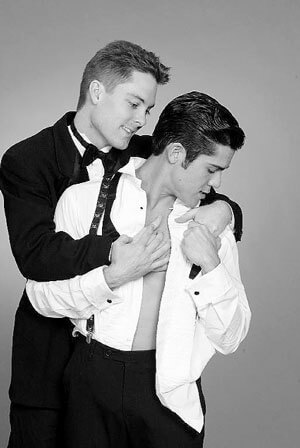Clint Jefferies’ play at Wings explores, does not surmount, problematic past
Don’t get put off by the Harlequin romance-sounding title of this two-act play currently on stage at the Wings Theater on Christopher Street. With strong stage delivery from a cast of promising young actors, and ambitious costume and set design, “African Nights” offers a safe bet for an evening of steady-going entertainment that taxes neither the nerves nor the analytical mind.
What happens when a group of opulent, pleasure-seeking expatriates in colonial Africa end up together in a lavish country estate for a weekend? Cocktails, drugs, and sex—and the result is a commentary on the impoverished interior lives of the materially rich.
The story is a familiar one, drawn as it is from actual historical details. Playwright Clint Jefferies based “African Nights” on the exploits of a group of wealthy American expatriates and titled British colonials living in the 1920s and 30s in what was called “Happy Valley,” a highland region outside Nairobi, Kenya.
The central character in the play, Lady Idina Erroll (played by Bekka Lindström), is a hedonistic doyenne known for hosting outrageous days-long parties at her estate, “The Clouds.” When the play opens, she is joined in her parlor by a companion, Kiki Whitney Preston (Karen Stanion), an American expatriate, who loves taking intravenous drugs and having a good time—she was known, in real life, as “The Girl with the Golden Syringe.” They are discussing how the rest of the tiny, repressed, white community disapproves of the decadent lifestyle of the Happy Valley set, and Lady Idina in particular. Both revel in the image of licentiousness and debauchery that the community has painted of them.
The scene is soon filled with the rest of the characters and their respective ills: Major Robert Effington (Joel Halpern) and his dour wife Margaret (Sheri Delaine), a couple caught in a joyless May-December marriage, Margaret being the older spouse; the British Prince George Windsor (Ed Roggenkamp), who is simultaneously enlivened and oppressed by the homosexual affair he is having with José Evaristo Uriburu (Johary Ramos), son of an Argentine ambassador; Angelo Vincente (Nick Marcotti), a working-class Italian-American who is Kiki’s drug-runner pilot and a closeted gay man himself; and Hassan (Antwan Ward), the coolly smoldering Somali servant, who is fiercely opposed to colonialism, but strangely devoted to Lady Idina, his “employer.”
The central intrigue of the play is whether or not Prince George will turn his back on a disapproving society to carry on a relationship with Uriburu. A parallel storyline involves an affair between Lady Idina and Major Effington.
Jefferies sought to spice up the dated plot details, already covered on the big screen in films such as “White Mischief” and “Out of Africa,” by having the cast strip nude on stage at various points. But it is the acting, directed by Jeffery Corrick, which makes the difference. This up-and-coming cast demonstrates a strong drive for industry recognition, with fine performances delivered by Ramos as the lovesick gay suitor, Marcotti as the horny and ornery closet case, and Delaine, whose unexpected venting session three-quarters of the way through the play takes the audience by surprise.
Jefferies, however, does not go a long way in dismantling colonial ideologies about Africa and the Africans. The manservant Hassan holds his tongue throughout the play, except for when he delivers a speech to Major Effington filled with foreboding parables. One is left to ask, why does the character not just state an opinion instead of sounding like the wise village chief? Hassan is simultaneously the noble savage, whose knowledge of human nature is seen as an asset more valuable than white money and power, and the calculating native who silently watches and waits, posing an ever-present threat to white authority.
The image of the Latino man is also problematic. While all the male characters and two of the women get naked, the audience is invited into the erotics of the play through Uriburu’s nude body, which, when we first see it, is the closeted Vincente’s object of desire. As the play unfolds, Uriburu develops into a hot-blooded Hispanic stereotype, unable to control his emotions, easily given to jealousy, yet, at the same time of course, unbeatable if one is looking for an encounter marked by unbridled passion.
“African Nights,” however, makes no pretense of traveling too far beyond the bounds of historical fiction. And in our post-colonial, gay marriage era, it nicely captures a time that is long gone.



































